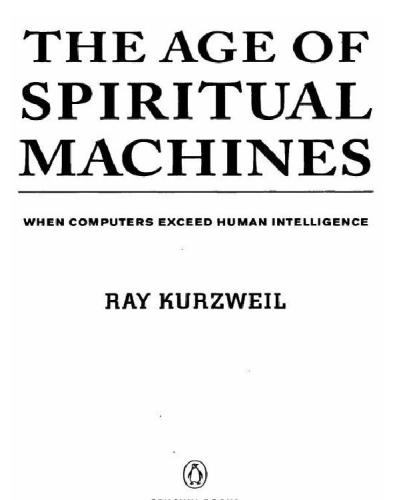
The Age of Spiritual Machines
When Computers Exceed Human Intelligence
- اطلاعات
- نقد و بررسی
- دیدگاه کاربران
نقد و بررسی

January 4, 1999
According to the law of accelerating returns, explains futurist Kurzweil (The Age of Intelligent Machines), technological gains are made at an exponential rate. In his utopian vision of the 21st century, our lives will change not merely incrementally but fundamentally. The author is the inventor of reading and speech-recognition machines, among other technologies, but he isn't much of a writer. Using clunky prose and an awkward dialogue with a woman from the future, he sets up the history of evolution and technology and then offers a whirlwind tour through the next 100 years. Along the way, he makes some bizarre predictions. If Kurzweil has it right, in the next few decades humans will download books directly into their brains, run off with virtual secretaries and exist "as software," as we become more like computers and computers become more like us. Other projections--e.g., that most diseases will be reversible or preventable--are less strange but seem similarly Panglossian. Still others are more realizable: human-embedded computers will track the location of practically anyone, at any time. More problematic is Kurzweil's self-congratulatory tone. Still, by addressing (if not quite satisfactorily) the overpowering distinction between intelligence and consciousness, and by addressing the difference between a giant database and an intuitive machine, this book serves as a very provocative, if not very persuasive, view of the future from a man who has studied and shaped it. B&w illustrations. Agent, Loretta Barrett; foreign rights sold in the U.K., Germany, Italy and Spain; simultaneous Penguin audio; author tour.

January 4, 1999
Kurzweil's reasoned scenarios of a "post-biological future" are as harrowing as any science fiction. That's the appeal of listening on tape to the inventor and MIT professor's provocative speculations on what could occur once computers reach or surpass human-level intelligence--then start to self-replicate. Computers, with their integrated circuit chip complexity, are sneaking up on us on an accelerated curve, he argues, citing the example of chess master Gary Kasparov's shocking loss to IBM's machine Deep Blue in 1997. Do computers represent "the next stage of evolution"? Will technology create its own next generations? Kurzweil suggests a timeline inhabited by "neural-nets," "nanobot" robots and scenarios of virtual reality where sexuality and spirituality become completely simulated. It's bracing and compelling stuff, propelled by the author's own strong egotistical will to prove his version of the future. Reader Sklar is thoughtful, if at times overly heavy on the ironies. Simultaneous release with the Viking hardcover.

April 1, 2015
Kurzweil's thoughts on the future of AI development appear in this best-selling work, in which his tech-positive perspective does not shy away from making grandiose predictions about how such development will intersect with the future of humanity. It inspired rock band Our Lady Peace's double-platinum album Spiritual Machines, on which Kurzweil reads short excerpts from the book. (LJ 12/98)
Copyright 2015 Library Journal, LLC Used with permission.




دیدگاه کاربران